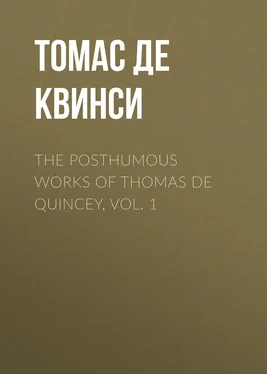Томас Де Квинси - The Posthumous Works of Thomas De Quincey, Vol. 1
Здесь есть возможность читать онлайн «Томас Де Квинси - The Posthumous Works of Thomas De Quincey, Vol. 1» — ознакомительный отрывок электронной книги совершенно бесплатно, а после прочтения отрывка купить полную версию. В некоторых случаях можно слушать аудио, скачать через торрент в формате fb2 и присутствует краткое содержание. Жанр: foreign_prose, literature_19, foreign_antique, на английском языке. Описание произведения, (предисловие) а так же отзывы посетителей доступны на портале библиотеки ЛибКат.
- Название:The Posthumous Works of Thomas De Quincey, Vol. 1
- Автор:
- Жанр:
- Год:неизвестен
- ISBN:нет данных
- Рейтинг книги:5 / 5. Голосов: 1
-
Избранное:Добавить в избранное
- Отзывы:
-
Ваша оценка:
- 100
- 1
- 2
- 3
- 4
- 5
The Posthumous Works of Thomas De Quincey, Vol. 1: краткое содержание, описание и аннотация
Предлагаем к чтению аннотацию, описание, краткое содержание или предисловие (зависит от того, что написал сам автор книги «The Posthumous Works of Thomas De Quincey, Vol. 1»). Если вы не нашли необходимую информацию о книге — напишите в комментариях, мы постараемся отыскать её.
The Posthumous Works of Thomas De Quincey, Vol. 1 — читать онлайн ознакомительный отрывок
Ниже представлен текст книги, разбитый по страницам. Система сохранения места последней прочитанной страницы, позволяет с удобством читать онлайн бесплатно книгу «The Posthumous Works of Thomas De Quincey, Vol. 1», без необходимости каждый раз заново искать на чём Вы остановились. Поставьте закладку, и сможете в любой момент перейти на страницу, на которой закончили чтение.
Интервал:
Закладка:
VIII. 'WHAT IS TRUTH?' THE JESTING PILATE SAID—A FALSE GLOSS
It is true that Pilate could not be expected fully to comprehend an idea which was yet new to man; Christ's words were beyond his depth. But, still, his natural light would guide him thus far—that, although he had never heard of any truth which rose to that distinction, still, if any one class of truth should in future come to eclipse all other classes of truth immeasurably, as regarded its practical results, as regarded some dark dependency of human interests, in that case it would certainly merit the distinctive name of 'The Truth.' The case in which such a distinction would become reasonable and available was one utterly unrealized to his experience, not even within the light of his conjectures as to its special conditions; but, still, as a general possibility it was conceivable to his understanding; though not comprehensible, yet apprehensible. And in going on to the next great question, to the inevitable question, 'What is the truth?' Pilate had no thought of jesting. Jesting was the last thing of which his impassioned mood in that great hour was capable. Roman magistrates of supreme rank were little disposed to jesting on the judgment-seat amongst a refractory and dangerous people; and of Pilate in particular, every word, every effort, every act, demonstrate that he was agitated with new instincts and misgivings of some shadowy revelation opening upon man, that his heart was convulsed with desponding anxiety in the first place to save the man who appeared the depositary of this revelation, but who, if, after all, only a sublime lunatic, was, at the very least, innocent of all offence. It must have struck all close observers of early Christianity how large a proportion of the new converts lay amongst Roman officers, or (to speak more adequately) amongst Romans of high rank, both men and women. And for that there was high reason. In the advance of civilization, and in the corresponding decay of idolatrous religions, there was fast arising a new growth of cravings amongst men. Mythological and desperately immoral religions, that spoke only to the blind sense of power, had been giving way through the three previous centuries to a fearful extent. They had receded from the higher natures of both Greece and Rome as the sea has locally receded from many shores of the earth. Such natures were left 'miserably bare'; the sense of dependency by any tie upon the invisible world, or at least upon the supernatural world, had decayed, and unless this painful void were filled up by some supplementary bond in the same direction, a condition of practical atheism must take place, such as could not but starve and impoverish in human nature those yearnings after the infinite which are the pledges of all internal grandeur. But this dependency could not be replaced by one of the same vicious nature. Into any new dependency a new element must be introduced. The sense of insufficiency would be renewed in triple strength if merely the old relations of weakness to power, of art to greater art, of intellect to higher intellect, of less to more within the same exact limits as to kind of excellence, should be rehearsed under new names or improved theogonies. Hitherto, no relation of man to divine or demoniac powers had included the least particle or fraction or hint of any moral element; nor was such an element possible in that dependency, for profound reasons.
IX. WHAT SCALIGER SAYS ABOUT THE EPISTLE TO JUDE
Before any canon was settled, many works had become current in Christian circles whose origin was dubious. The traditions about them varied locally. Some, it is alleged, that would really have been entitled to a canonical place, had been lost by accident; to some, which still survived, this place had been refused upon grounds that might not have satisfied us of this day, if we had the books and the grounds of rejection before us; and, finally, others, it is urged, have obtained this sacred distinction with no right to it. In particular, the Second Epistle of St. Peter, the Second of St. Jude, the Epistle of St. James, and the three of St. John, are denounced as supposititious in the 'Scaligerana.' But the writer before us is wrong in laying any stress on the opinions there expressed. They bear the marks of conversational haste and of Scaligeran audacity. What is the objection made, for instance, to 'in quibus sunt mira, quæ non videntur esse Apostolica'? That is itself more strange as a criticism than anything in the epistles can be for its doctrine. The only thing tending to a reason for the summary treatment is that the Eastern Church does not acknowledge them for canonical. But opinions quoted from ana are seldom of any authority; indeed, I have myself too frequently seen the unfaithfulness of such reports. The reporter, as he cannot decently be taking notes at the time of speaking, endeavours afterwards to recall the most interesting passages by memory. He forgets the context; what introduced—what followed to explain or modify the opinions. He supplies a conjectural context of his own, and the result is a romance. But if the reporter were even accurate, so much allowance must be made for the license of conversation—its ardour, its hurry, and its frequent playfulness—that when all these deductions are made, really not a fraction remains that one can honestly carry to account. Besides, the elder Scaliger was drunk pretty often, and Joe seems rather 'fresh' at times.
Upon consideration, it may be as well to repeat what it is that Scaliger is reported to have said:
'The Epistle of Jude is not his , as neither is that of James, nor the second of Peter, in all which are strange things that seem (seem—mark that!) far enough from being Apostolical. The three Epistles of John are not from John the Apostle. The second of Peter and Jude belong to a later age. The Eastern Church does not own them, neither are they of evangelical authority. They are unlearned, and offer no marks of Gospel majesty. As regards their internal value, believe them I may say that I do, but it is because they are in no ways hostile to us. '
Now, observe, the grounds of objection are purely æsthetical, except in the single argument from the authority of the Eastern Church. What does he mean by 'unlearned,' or wanting 'majesty,' or containing 'strange things'? Were ever such vague puerilities collected into one short paragraph? This is pure impertinence, and Phil. deserves to be privately reprimanded for quoting such windy chaff without noting and protesting it as colloquial. But what I wish the reader to mark—the θο ἑπιμὑθιον—is, that suppose the two Scaligers amongst the Christian Fathers engaged in fixing the canon: greater learning you cannot have; neither was there, to a dead certainty, one tenth part as much amongst the canon-settlers. Yet all this marvellous learning fumes away in boyish impertinence. It confounds itself. And every Christian says, Oh, take away this superfluous weight of erudition, that, being so rare a thing, cannot be wanted in the broad highways of religion. What we do want is humility, docility, reverence for God, and love for man. These are sown broadcast amongst human hearts. Now, these apply themselves to the sense of Scripture, not to its grammatical niceties. But if so, even that case shows indirectly how little could depend upon the mere verbal attire of the Bible, when the chief masters of verbal science were so ready to go astray—riding on the billows so imperfectly moored. In the ideas of Scripture lies its eternal anchorage, not in its perishable words, which are shifting for ever like quicksands, as the Bible passes by translation successively into every spoken language of the earth.
Читать дальшеИнтервал:
Закладка:
Похожие книги на «The Posthumous Works of Thomas De Quincey, Vol. 1»
Представляем Вашему вниманию похожие книги на «The Posthumous Works of Thomas De Quincey, Vol. 1» списком для выбора. Мы отобрали схожую по названию и смыслу литературу в надежде предоставить читателям больше вариантов отыскать новые, интересные, ещё непрочитанные произведения.
Обсуждение, отзывы о книге «The Posthumous Works of Thomas De Quincey, Vol. 1» и просто собственные мнения читателей. Оставьте ваши комментарии, напишите, что Вы думаете о произведении, его смысле или главных героях. Укажите что конкретно понравилось, а что нет, и почему Вы так считаете.











